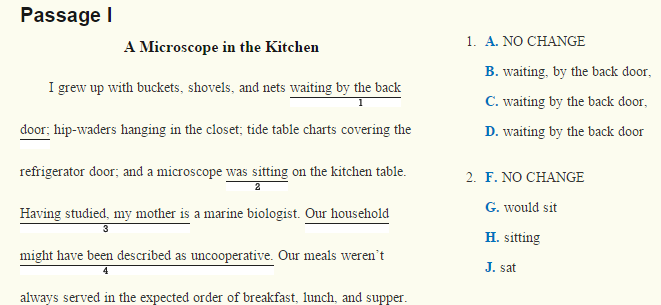Preparing for the ACT can be a stressful time. After all, there are a lot of things to consider (such as what average ACT scores are) and there may be a lot riding on your ACT score! But take a few deep breaths. Use this ACT format and section guide to help you prepare for what’s ahead. Then – study your butt off so that you can get the highest score possible!
First, an overview look at the test and its format and timing:
| Section | Questions | Time |
| Math | 60 questions | 60 minutes |
| Science | 40 questions | 35 minutes |
| Reading | 40 questions | 35 minutes |
| English | 75 questions | 45 minutes |
| Writing (optional) | 1 essay | 40 minutes |
As you can see, the ACT is made up of four main sections, plus an optional essay. The Q&A section of the ACT includes a total of 215 total questions, with 2 hours and 55 minutes of total test time.
Although the essay is not required, it’s generally advisable that students take this portion as well.
ACT Question Format
ACT questions are administered in a multiple-choice format. Questions contain possible answers and students are asked to select the correct one.
The answer formats will vary from section to section and from question to question.
ACT Scoring
The ACT scores on a scale of 1 to 36. Each of the test sections are also scored on the same scale.
Students receive their individual section scores, as well as a composite score. Colleges generally use the composite score to evaluate a student’s performance on the test (although some schools may ask for individual subtest scores).
The optional writing portion (essay) is scored separately on a scale of 1-12.
ACT Math Topics
The ACT math portion can be one of the most stressful for some students. But the topics covered in this section span what most students will cover in their middle and high school careers.
Math concepts include:
- Basic math (additional, subtraction, etc)
- Exponents
- Scientific notation
- Basic algebra
- Quadratic formula
- Polynomials
- Basic geometry (coordinate geometry)
- Geometric proofs
- Trigonometric identities
Questions include 5 possible answers and students are asked to select the correct one.
ACT Science Topics
The ACT science section will test your knowledge and understanding of scientific concepts and principals. Although there’s no lab portion (for obvious reasons), it will require students to understand the basics of conducting experiments as well as analyzing and interpreting data to draw conclusions.
In this section, you’ll see exercises related to:
- Reading and understanding graphs/charts
- Reading and summarizing scientific findings
- Drawing conclusions based on provided data
- Understand and apply scientific principals to specific scenarios
ACT Reading Topics
In the ACT reading portion, you’ll be tested on your reading comprehension skills. These questions include reading through written passages and then answering questions related to the interpretation of the passage you’ve just read.
This is different from the English section, which tests knowledge like spelling and grammar. In this portion, you’ll be expected to read and then analyze or interpret what was written.
The test will cover things such as:
- Understanding the “main idea” of a written passage
- Analyzing cause and effect
- Comparisons and analogies
- Writing method and style
ACT English Topics

Sample passage from the ACT English section. Source: ACTstudent.org
The ACT English section of the test will cover a variety of topics related to reading and writing in English. Specific topics include:
- Spelling
- Punctuation
- Grammar
- Sentence structure
- Style
![]() Most of these questions will consist of written passages with underlined sections. Each underline section will correspond to a question, which will offer some possible changes to that part of the passage.
Most of these questions will consist of written passages with underlined sections. Each underline section will correspond to a question, which will offer some possible changes to that part of the passage.
Many questions include a “no change” option. Mark it if the underlined passage does not need any changes to be made.
ACT Writing Portion
Another portion of the ACT that often gives students pause is the ACT essay portion. Many students wonder how the test is scored and what constitutes a “good” essay versus a “bad” one.
In this case, we refer directly to ACTstudent.org to see that the essays are evaluated on 4 key criteria:
- Ideas and analysis
- Development and support
- Organization
- Language use
As you may be able to tell from these criteria, the essay will not generally require a student to have any prior knowledge of any particular topic beforehand. Instead, the test will supply some information and ask the student to consider, evaluate, or analyze that information to create an informed and persuasive argument.
Remember that there are certainly no “wrong” answers to the essay. The key to scoring well is to write a stylistically and mechanically sound essay (grammar, spelling, etc), as well as use the available information to write a compelling and logical defense of your opinion.
Check to see how your ACT scores affect your acceptance odds with College Raptor!






